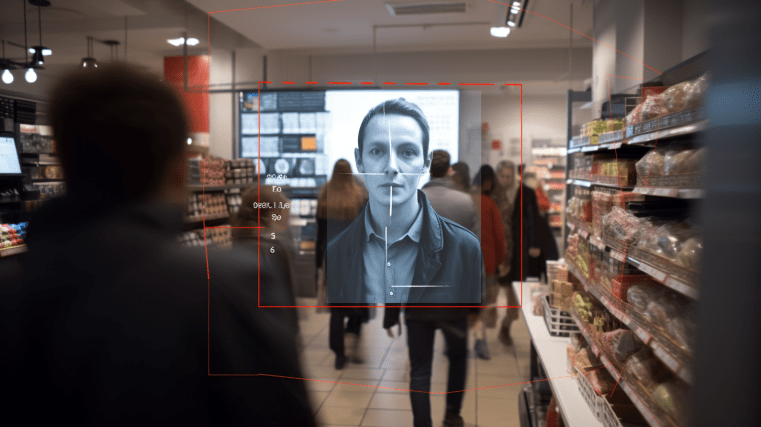Photo was created by Webthat using MidJourney
Balancing Security and Privacy: The Rise of Facial Recognition in UK Stores
A growing number of stores in the UK are implementing facial recognition systems powered by artificial intelligence (AI) to identify repeat shoplifters, leading to concerns about the spread of “airport-style security” on the high street. This article examines the use of AI-based facial recognition technology in retail settings and the implications it has for privacy and potential biases.
The Functioning of Facial Recognition Systems
Stores utilizing facial recognition technology employ it in the following manner: when a store manager becomes aware of a stolen item, they review security camera footage to identify the thief. They then access the facial recognition system, which has recorded video of all customers entering the store that day, to locate the suspect and log the incident. If the same individual attempts to enter the store again, the manager receives an alert, enabling them to take appropriate action.
Concerns Raised by Human Rights Groups
Human rights groups argue that such technology disregards individuals’ right to privacy and is prone to errors. According to Big Brother Watch, a UK civil liberties campaign group, technologies like Facewatch are normalizing excessive security measures in everyday scenarios, akin to airport screenings. Recording shoppers’ biometric data equates to demanding their fingerprints or DNA samples merely to enter a store, which raises significant privacy concerns.
Accuracy and Potential Mistakes
Simon Gordon, founder of Facewatch, claims that the facial recognition system was 99.85% accurate in identifying repeat offenders in the previous month. However, mistakes can occur. In such cases, individuals wrongly flagged as offenders can file complaints to have their details erased from the system. Gordon acknowledges that instances of mistaken identity have occurred, primarily due to individuals resembling others. Nevertheless, he emphasizes that such errors are promptly rectified by deleting the individuals’ information.
Legality, Data Retention, and Bias
Gordon notes that the use of facial recognition technology in the UK is legal, with businesses required to display a notice indicating its implementation. Facewatch retains shoppers’ data for only two weeks, half the time typically retained by standard CCTV cameras. Despite these safeguards, concerns persist. Human rights advocates argue that individuals should not have to prove their innocence proactively and caution against the potential biases embedded in AI-powered software.
Balancing Security and Privacy
The rise in violence, abuse, and theft in stores across the UK has led to an increased demand for AI-driven solutions like facial recognition systems. While proponents argue that such technology aims to protect staff and mitigate revenue loss caused by repeat offenders, critics maintain that the complex issues surrounding shoplifting require more comprehensive solutions than AI-driven approaches. As governments around the world grapple with regulating AI, the use of facial recognition technology in retail settings continues to attract attention and scrutiny.


